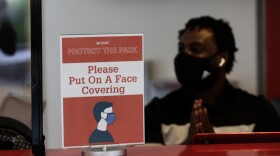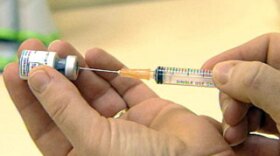When school resumed in August, nearly half of all public-school students in North Carolina spent at least some time in-person, in a classroom. Now, more districts are looking to return to some face-to-face instruction.
The people at the so-called 'Plan B' schools may have something to teach others about what has worked, and what hasn't.
Take for example, Swansboro High School — the home of the Pirates. The school is a low-slung building with a green roof that sits back from Route 24 in the small coastal town that many travel through to get to and from the south end of Emerald Isle.
School administrators there have a lot of pride with how they have pulled off having students in-class since August.
"We’re officially half-way through the semester, but if you looked at it year-long we would be a quarter of the way through the school year, so remarkable," said Helen Gross, Swansboro High School's principal. "Here we are with a successful nine weeks under our belts."
It's been such a success, says Gross, that she and her staff recently had a little party.
"We referenced it as the spookiest semester ever in history," she said. "We did a little Halloween theme with chili and caramel apples."
Swansboro is in Onslow County, and Covid spread isn't any better or worse there than most everywhere else in North Carolina. It's home to Camp Lejeune and the city of Jacksonville, and has about the same number of cases as Orange County.
Swansboro High doesn't test students and staff, and neither do most schools doing in-person instruction. But Gross says they do the baseline safety protocol for schools that chose Plan B, including temperature checks and mandatory masks.
Back in August, when Swansboro reopened, many predicted that every day at an open school would be a super-spreader event, but that has not been the case, as Dr. Anthony Fauci, director of the National Institute of Allergy and Infectious Diseases, said in an interview with CBS News last week.
"For the most part there has not been an indication that children are massively spreading the virus in community," Fauci said. "I’m sure there will be some kind of indication that that could happen, but that is not something that we’re seeing right now."
Fauci says the decision to reopen a school should depend on COVID spread within the local community. Students could come back with low and even moderate spread – and safety protocols. But high-rate areas should stay in remote learning.
As well as things have appeared to go in Swansboro, other schools that reopened to some in-person activities have seen problems.
In Wayne County, about an hour east of Raleigh, two elementary schools closed for two weeks after outbreaks.
Tiffany Kilgore teaches chorus and music at Norwayne Middle School. She got COVID despite working remotely, and has since recovered. She says her experience with the virus makes her worry that teachers, including her husband, are being exposed.
"I’m in my recliner where I’ve been for a week and a half," Kilgore said. "We did everything right. I have a pre-existing condition, so I stayed at home."
Kilgore spoke during a virtual town hall hosted by the North Carolina Association of Educators.
She says the Wayne County School district wasn’t prepared, and didn’t have adequate cleaning supplies.
"Twenty-two of our 33 principals said they weren’t ready and they needed more time," Kilgore said. "And our county refused to listen to our leaders."
Some teachers across North Carolina are sounding similar alarms to school boards currently pressing for in-person classes.
That's the case in Wake County, the state's largest school district.
"I am glad that we're moving forward," said Christine Kushner, a member of the Wake County School Board, during a recent meeting. She voted for the phased reopening, citing feedback from parents. "But I am also concerned that there are some students who are struggling with remote learning."
Back at Swansboro High, Principal Helen Gross says families in her district have been great about keeping their students home if there’s any concern about their health. But as the state's case numbers continue to rise, she's looking at more hurdles ahead.
"Things are resuming, like your normal childhood life of extracurricular activities," Gross said. "Soccer and dance and all that kind of fun stuff, is continuing outside of school, and that’s where we’re seeing close contacts."
Those close contacts will get even closer in school buildings across North Carolina, as more students and teachers come together, indoors and in person.










